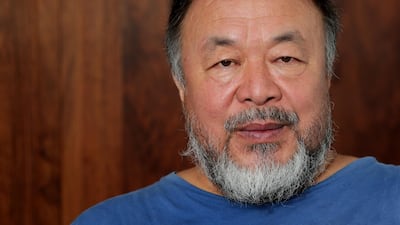After living in self-imposed exile in Berlin since 2015, Ai Weiwei has announced that he is leaving Germany.
The Chinese artist criticised the country for what he sees as intolerance for opposing views and the government's passivity to Chinese censorship.
"Germany is not an open society," Ai said in an interview with German newspaper Die Welt. "It is a society that would like to be open, but above all protects itself. German culture is so strong that it doesn't really accept other ideas and arguments. There is hardly any room for open debate, hardly any respect for dissenting voices."
A critic of the Chinese government, the sculptor, filmmaker, photographer and installation artist has used his art to address issues of authoritarianism, human rights abuses and corruption. In 2011, he was detained in Beijing for 81 days without charge, then banned from travel for the next four years. When his confiscated passport was eventually returned to him in 2015, he left China to join his wife and son in Germany.
On his decision to leave Berlin, the artist described instances of discrimination, including being kicked out of taxis several times. On one occasion, an argument with a driver led him to file a report to the authorities, whose investigation dismissed the case as a matter of "cultural differences".
Ai is not one to shy away from criticising western governments and political figures, too. Recently, he called out the British government for failing to intervene in the crackdown on pro-democracy protesters in Hong Kong, and condemned US President Donald Trump for referring to them as riots. He claimed that the same goes for Germany.
Ai has also spoken out about the perceived influence of Chinese censorship on the arts. In February this year, his segment in the anthology film Berlin, I Love You was removed shortly before the movie's release. The artist claimed that producers were afraid to lose Chinese funding of the next film in the line-up.
"The reason we were given for the episode's removal was that my political status had made it difficult for the production team to secure further funding. We discovered that one of the executive producers of the film is also producing a Shanghai instalment of the series," he wrote in an Instagram post.
His most recent film, The Rest (2019), which focuses on the state of limbo endured by refugees when they enter Europe, has not been included in the Berlinale or Berlin International Film Festival this year. While acknowledging that film festivals can make selections at their discretion, Ai accused the Berlinale for seeking China's approval when it came to their decision-making. "The festival only accepts what has received the golden seal from the Chinese authorities," he said.
Over the years, Ai has turned his attention to highlighting the plight of refugees. His massive installation piece Law of the Journey – a black inflatable life raft with 300 figures on board – has been displayed around the world. His 2017 film Human Flow drew stories from more than 20 countries and 40 refugee camps where displaced individuals were living.
It is a topic that has a deep emotional connection for Ai, who considers himself a refugee. His family was sent to a labour camp in 1958, a year after he was born, and then exiled to north-west China for 16 years. They returned to Beijing after the end of the Cultural Revolution, and the artist eventually moved to the United States, but returned to China when his father fell ill.
Now that he is leaving Germany, Ai is uncertain of his next destination. He said, “I have no home because China has rejected me since I was born. [He] who knows his destination is no longer a refugee. I am a refugee.”


